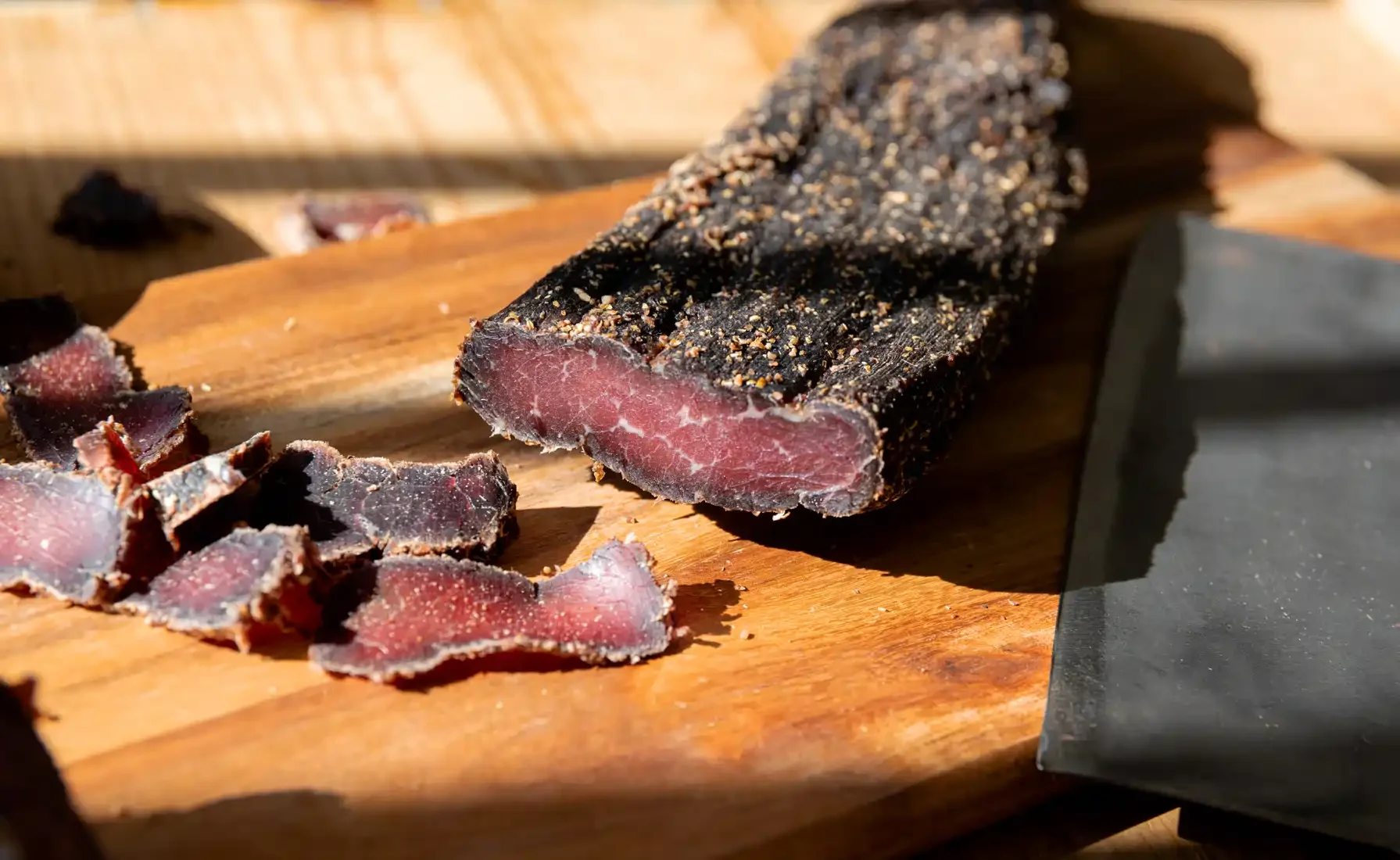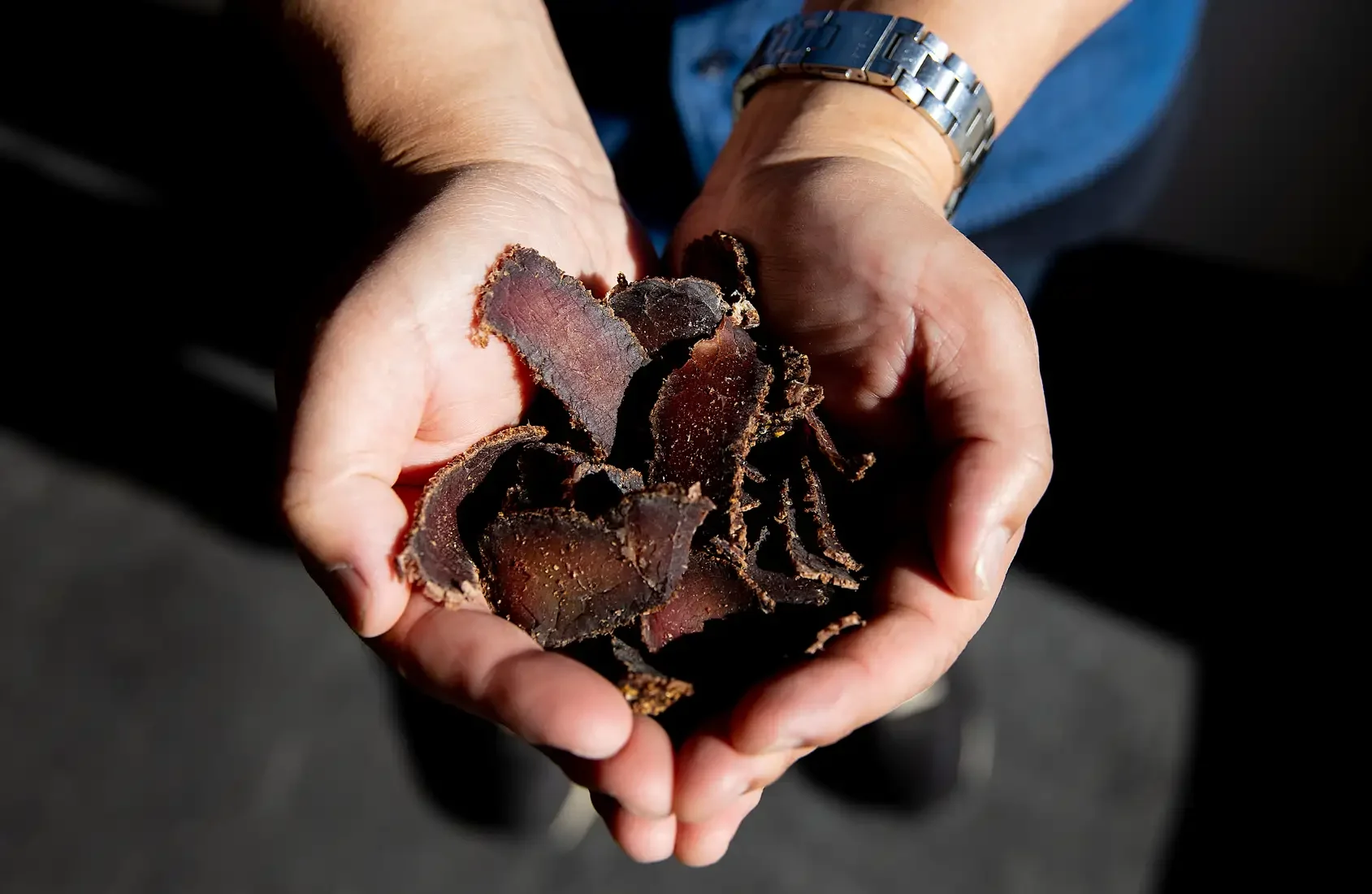Beef Biltong vs Protein Bars
‘Ready to eat’ protein bars and biltong are popular choices for those living active lifestyles. With many different protein snacks on the market, it’s easy to think you’re buying something healthy - when in fact, a lot of ‘so called’ healthy brands are packed with refined sugar, additives and artificial preservatives. Biltong, on the other hand, is single source of protein and naturally low in sugar and carbohydrates. In this article, we’ll explore some of the key differences between biltong and protein bars – and which one is a better snack option.
Protein Bars
Protein bars typically contain whey, casein, soy, pea or rice protein. Some other common ingredients include nuts, sugar, binders, fillers and carbohydrates such as rice malt syrup and oats. Ideal as a quick energy boost, protein bars are a quick, convenient and tasty option. Often used during pre and post workouts, there are several types of formulations readily available from health food stores, supermarkets and local gyms. Whether taken as a meal replacement or low carb snack in between meals, protein bars are a versatile and easy choice when it comes to your search for a nutrient dense snack.
Biltong
Biltong, on the other hand is a different kind of protein snack. This South African air-dried meat snack is made from premium quality beef and is cured over several days.
Often mistaken for jerky, it is very different in terms of flavours, spices and the curing process involved. As the local South Africans like to say, biltong is better than jerky – it’s lekker! Naturally high in protein, low carb and very low in calories, biltong is fast becoming the top choice for those looking for a healthy snack option. With so many delicious flavours to choose from - peri peri, tradtional, Spanish paprika and spicy Sichuan, there’s no better way to satisfy those mid-morning or mid-afternoon cravings.
Rich in protein, low in sugar and packed with iron and essential amino acids, you can enjoy guilt free snacking knowing there are minimal artificial additives and nasties added. Marinated with only vinegar, salt, spices and other natural flavours, biltong is a much better alternative to sugary protein bars. Because it’s a single source protein ( premium quality beef), it delivers fast, sustained energy throughout the day, that is also healthy and delicious.
What Can Make Some (not all) Protein Bars Unhealthy?
Protein bars contain more sugar, additives, preservatives, artificial colours and flavours
Highly processed and lacking in nutritional quality
Some contain unhealthy oils and fats such as palm oil and saturated fats
Because of the higher content of fat, sugar and artificial ingredients, it can cause weight gain, digestive problems and metabolic issues.
Where Does Biltong Stand on the Health Scale?
Depending on the brand, some can be higher in sodium due to the unique marination process
Unlike Protea Foods, some brands use fattier cuts of beef
Some brands may use nitrates or preservatives in their biltong but biltong tends to contain less nitrates compared to other air-dried meats. Protea Foods biltong had no added preservatives.
Why we believe Biltong is a better choice for your health
No matter which way you look at it, biltong is clearly the better choice as a high protein snack option, particularly if you’re counting calories and managing your weight. Protein bars are far more processed and often come enhanced with fillers, sucrose syrup, chocolate and nuts. Being a complete protein, biltong contains minimal additives, making it a healthier snack option. Of course, everything in moderation is key – even if it is considered healthy. It’s also packed with lots of vitamins and minerals that support healthy muscles, exercise recovery and sustained energy production.
If you’re looking for a wholesome snack alternative, biltong is a clear standout
In closing, making smarter choices when it comes to your health should be number one priority. Biltong offers incredible nutritional value, contains less preservatives and is a more concentrated form of clean protein. Protein bars on the other hand, do contain higher levels of protein, but are more processed and come with added sugar, fillers and other unhealthy additives. We know which one we would choose – biltong all the way.
Common questions about Beef Biltong in comparison to Protein Bars
-
Yes, compared to protein bars, biltong is generally a more health-conscious option. Protea Foods Biltong is a single source protein made from air dried beef, naturally low in sugar and carbohydrates, and minimally processed. In contrast, many protein bars contain refined sugars, fillers, artificial flavourings, and preservatives, all of which could dilute their overall nutritional value.
-
Absolutely. Protea Foods biltong is rich in high quality protein, iron and essential amino acids, making it well suited to active lifestyles. It supports muscle recovery and provides sustained energy, helping you feel fuller for longer
-
Yes. Biltong is naturally lower in sugar whereas many protein bars rely on added sugars or syrups, to heighten flavour and texture. This makes biltong a better option for those focused on weight management, blood sugar control or following low carb or keto style diets.
-
Protea Foods biltong is often the superior option for weight management because it is high in protein, low calories and contains no additives. Its high protein content helps promote satiety which makes you feel fuller and satisfied which can lead lower snacking, while many protein bars contain hidden sugars and fats that can slow progress toward weight loss goals.
-
This depends on the brand. Traditional biltong is produced with vinegar, salt and natural spices, as is the case with Protea Foods biltong, while some other commercial brands add preservatives or nitrates. Other meat snacks on the market, such as jerky or salami sticks can also typically contain preservatives and nitrates. For a healthier, guilt free option, choose quality biltong such as Protea Foods.
-
Yes, yes, yes! It is definitely better! Biltong differs significantly from jerky in its preparation and nutritional profile. Biltong is air dried rather than heat dried, uses a distinct spice blend, and typically contains less sugar and fewer preservatives. As a result, biltong is generally more tender, flavourful and nutritionally dense compared to most products.


